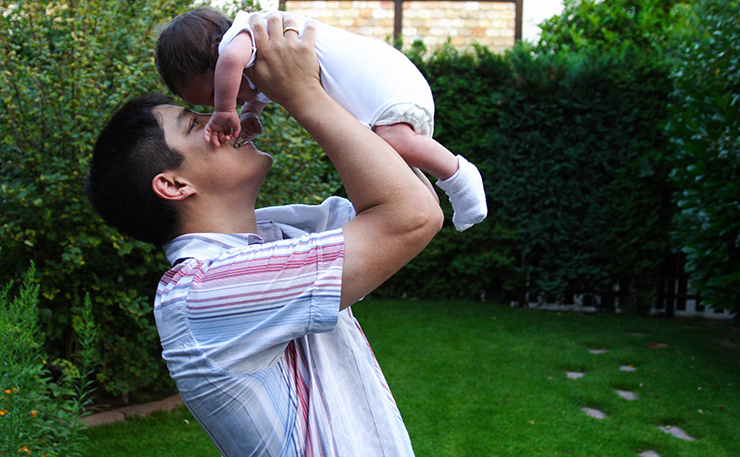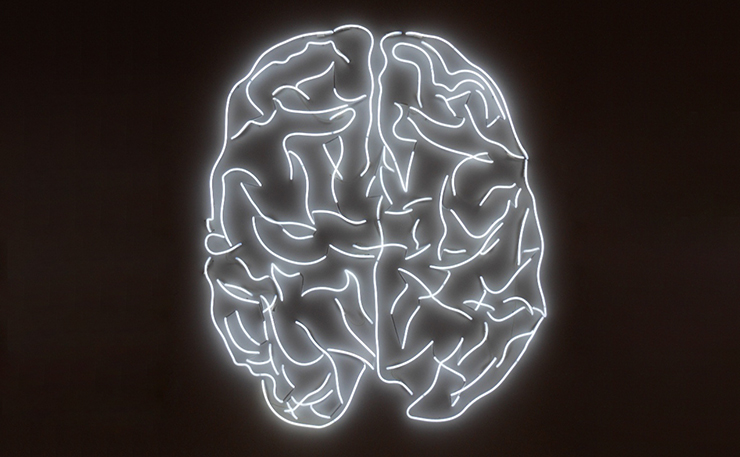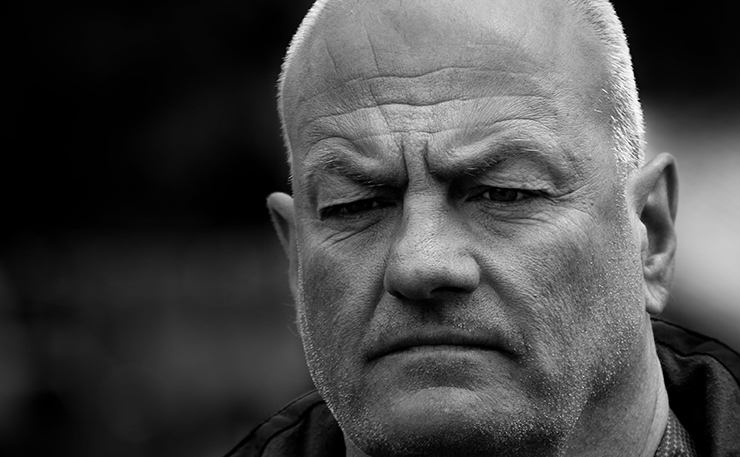 One of the downsides of the Voice to Parliament referendum is the pressure on individuals about how they may vote. But there are upsides too. Psychiatrist and ‘Dad expert’ Dr Matthew Roberts explains how to swing the minds and maybe even the votes of a much-maligned group of Australians. You might even strengthen your relationship in the process.
One of the downsides of the Voice to Parliament referendum is the pressure on individuals about how they may vote. But there are upsides too. Psychiatrist and ‘Dad expert’ Dr Matthew Roberts explains how to swing the minds and maybe even the votes of a much-maligned group of Australians. You might even strengthen your relationship in the process.
On Fathers’ Day this year I learned that men over 50 are the least likely to vote Yes in the referendum. The Yes23 campaign posted on the socials, encouraging us to open up conversations with dads in this age group, and giving pointers on how to do that.
Flies on walls at Father’s Day lunches nationwide would have not been bored, I am guessing. The referendum threatens to divide families, and where Dad is a ‘No’ voter there are two questions for ‘Yes-inclined’ family members:
- Can you influence him at all?
- And if not, how can you protect your relationships from the division sown so willingly among us?
As a Fatherhood Clinician, and a founding member of the Australian Fatherhood Research Consortium, I’ve worked mostly perinatally with men struggling with depression, anxiety and other issues, some of whom are now approaching 50, but most of whom are much younger.
Nonetheless, as a student of fatherhood both personally and professionally, I wonder if there is something the Fatherhood field can offer at this crucial time for our country.
Many of the older men who will vote No on Oct 14 are dads. They will each have their own reasons for doing this, to which they are entitled, and many of which no-one is likely to be able to shift. But some may be motivated by a belief – however it took root in their minds – that ‘Yes’ is too much of a risk.
They may believe that they are protecting future generations by maintaining the status quo for our constitution and First Nations people. And it’s those men I think the field of Fatherhood research has something to tell us about.
In a much-cited research project years ago, new mums and new dads were observed playing with their babies, and blood samples taken of parental oxytocin (the bonding hormone). Mums got the oxytocin surge when they cuddled and comforted their babies; Dads got it when they excited their babies, lifting them up high, stimulating them.

Later on, common patterns are observed with toddlers and pre-schoolers playing: kids generally go to Mum for comfort and reassurance, while dads are the ones for tickles, rough-and-tumble play, and… risk-taking.
In an ever-more risk averse world, having a dad at your back saying ‘go on, give it a go’ is so important. It lets us practice with risk, holds our fears in check, and helps us to grow. And yet here so many men are, granddads many of them, lining up at the booth to say it’s too risky. With a major growth opportunity for the whole country in play, they can’t bring themselves to say to their young ‘go on, give it a go’.
Now, it’s really important not to shame these older men for this.
The first thing I learned when trying to reach dads after training in what was then called ‘Mother-Baby Psychiatry’ is that shame among men is common, and it makes men hide. They can hide literally, never seeking help from the likes of me, but more common and often missed is the hiding of parts of men that are vulnerable, in pain, overwhelmed.
These parts can hide behind rage, controlling behaviours, problem drinking, smoking, overeating and other clearly harmful behaviours. But shame can also hide behind workaholism, black humour, socialised prejudice and non-extreme political views that nonetheless externalise problems and threats.
Shame isn’t necessarily conscious. There is plenty to be ashamed of implicitly among older white men when that demographic has been behind so much recent and distant history of inhumane acts. By belonging to a demographic none of those little boy babies of mid-last century ever got to choose, they are in the shaming crosshairs in so many ways.
Crucially, nervous systems in shame cannot approach something that might be risky. Our internal signalling says hide, freeze, wait. Yes-inclined family members may be asking these men to do something their nervous systems are saying cannot and must not be done.

That is partly because public campaign messages have left them believing Yes would be a significant risk, a claim there’s clear evidence to refute. But the misinformation cat is out of the bag, and the ’too risky’ assessment has been made by older white male nervous systems everywhere.
One cause of this risk assessment can be a man’s shame, even if it’s only a small part of his makeup, and even if it’s beyond his awareness.
Shame, even in small amounts, stops us from even approaching risk, to weigh up if it’s a good risk, let alone taking the risk. Shame gets us to assume any risk is too much. So if he’s got any form of shame going on, it’s less likely that Dad will be convinced that Yes is not too much of a risk.
But it’s possible to ease his nervous system out of any shame-driven hiding it might be doing, so he can choose to re-approach the risk and wonder if it might be worthwhile taking.
How might that happen? How might you make a difference to your No-It’s-Too-Risky Dad? You might hope he changes his vote, but even if he votes No as is his right, what I’m suggesting might help your relationship anyway.
So, sit or walk alongside him. Do something useful together maybe. Direct eye contact can be wonderful but often too much for a bloke with his armour on. Ask him about his hobbies, seek his counsel about practical things, then when things are flowing a bit more, ask what being a dad is like these days.
How has it changed? What was the best thing about it when you were little? What was the hardest thing? And now? What does he hope for? What’s he most worried about? If he had his time again, would he do it the same? If there was one bit of ‘Dadvice’ you could get tattooed somewhere proud and visible for posterity, what would it be?
Notice that nowhere in there have I suggested you mention the Yes/No thing. What? Surely you have to slip it in at some point? That’s what the Yes23 Father’s Day post suggests: talk about the vote!

What I am suggesting here is called Strength-First engagement. It builds a bridge to difficult stuff, to men or their parts that are hiding in shame, and it’s made my practice with hundreds of men and their families possible.
Once you have that bridge built, you and Dad are talking and it feels ok, safe, do-able, you can turn to the task of approaching the contentious issue.
Be curious. This referendum thing, what does he think? Why? And why does he think that? When did it click for him that that was the case? Who has he found talks sensibly about it? Any recommendations for stuff to watch or read? How does he think you should vote? Why? What does he think will happen on Oct 14? And after that?
When you adopt this inquisitive approach, the worst anyone can generally accuse you of is being nosy.
But that’s usually defensible with ‘but I’m just curious Dad.’
I use this ‘beginner’s-mind’ approach in my therapy work all the time and it generally stops people’s shame-shutters from slamming down.
I rarely have to convince anyone to follow my advice, because when we set up a space where they feel less shame and more safety, they tend to advise themselves, and… sometimes they even follow that advice.
If after your bridge-building and gentle inquiry, Dad says something inquisitive of his own, like ‘So how are you going to vote?’ you might only have to say ‘By going to the school and having a sausage Dad!’. Because if he’s feeling safe enough to ask you that, odds are the cogs are turning.
You’ve done your bit for your Dad-You relationship, and the biggest No-voting group in the land might just have shrunk a bit. But even if not, he’s still your dad, and you just talked. That’s not nothing.
Plus, you never know, he just might join the dads at our back as a nation, saying ‘go on, give it a go’.
Donate To New Matilda
New Matilda is a small, independent media outlet. We survive through reader contributions, and never losing a lawsuit. If you got something from this article, giving something back helps us to continue speaking truth to power. Every little bit counts.




